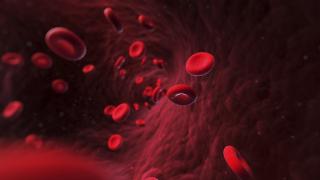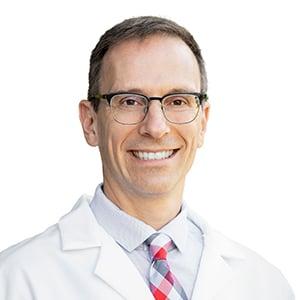Andrew Artz, M.D., M.S., has dedicated his career to helping older adults with diseases such as leukemia and myelodysplastic syndrome.
The associate clinical professor of hematology and hematopoietic stem cell transplantation works with patients to create treatment plans that meet their goals. As the director of the Aging and Hematologic Malignancies Program, he leads research to improve care for seniors — especially making stem cell transplants available to more patients. He recently published a study showing that older adults have improved stem cell transplant outcomes when they receive team-based, holistic evaluation before undergoing the procedure.
Breakthroughs spoke with Artz about what older patients should know going into treatment.
What are some of the factors patients should consider when meeting with their doctors?
I encourage patients to go to their doctor’s appointments without having already prejudged what they want. They should come in neutral and ready to listen to what’s being recommended.
There will be a lot of information, so patients should ask their physicians if they can record the visits or take notes. Bring your family members or other support with you.
And patients should really listen to themselves and their heart. They know their health better than anyone. If you’re concerned about how your body will handle something, tell your physician. And if you feel strong and fit, you should tell your physician that, too.
As their treatment moves forward, what should patients keep in mind?
Throughout the process, patients should think about their goals, short-term and long-term. They have to communicate these goals to the treatment team. I recommend patients ask their physician directly what is most important to get through treatment.
Everyone wants to live longer and healthier, but sometimes family events or other milestones are so important, they take priority over everything except the most pressing medical needs. Other people are willing to miss events now so that they can make events in the future.
What about the emotional component?
The emotional component is a central part of dealing with serious illness, but often not discussed. It’s essential that patients have advocates and support. The road is often rocky, and you need someone to lean on. Also, patients do better when there are two sets of ears at appointments and someone advocating on their behalf at clinic visits and other medical encounters.
People should try to be positive in their goals, but recognize it’s a natural part of the illness to be frustrated, anxious and angry. Nobody wants to be sick. Patients and family members do best when they recognize it is normal to fear the unknown, to be frustrated or to cry. There are days when you want to give up and say, “Why me?” Once you accept this is part of the journey, you can then refocus efforts on being positive. I also strongly believe in the benefit of a shared experience by finding others with a similar disease to connect with. This can be through support groups, patients paired to you from your doctor or even from people you meet at the treatment center.
How should patients involve their family members?
Family members, or caregivers for that matter, do much more than provide emotional support. It is invaluable that they be present at the physician’s meeting. It’s better for family members to hear information directly. When that’s not possible, family members can listen on the telephone, or a recording of the visit can be shared. I recommend family members save questions until the end of the visit and hear fully what the doctor has to say.
Family members should focus questions on how to help the patient rather than understanding the disease process.
During the more serious treatments, such as transplant, when people feel less well, I recommend the patient’s advocate be the point person for questions and updates from friends and extended family. This avoids the patient answering the same question multiple times, which is tiring and often counterproductive. Many people have their family member compose a summary that goes out to everyone on a website such as Caring Bridge, or over email. That way, they can communicate to many people at once.
How much should patients reveal to friends and family?
To the extent the relationship can handle it, you may as well tell people. Most people may not know how to respond when they hear someone has cancer. Still, the only way to be supported is for other people to know -— many people will sincerely ask how they can help. Take them up on it!
There are so many ways people can help if given information: cooking meals, driving to appointments, helping with family, covering at work and offering financial support.
What should patients know about stem cell transplants?
It’s as emotionally difficult as it is physically difficult. How long recovery will take is difficult to predict, especially for stem cell transplants with a donor.
Staying physically active both before and after the transplant allows patients to recover faster. If you have concerns about how much activity you can do, ask your doctor. Exercise does not need to be intense — even small amounts of regular activity such as walking will have benefits.
Patients must reconcile that the disease and transplant are very challenging emotionally. Normal concerns include fears about disease return, recovery time, altered relations and financial losses, just to name a few. Patients should talk to their family members about these concerns rather than burying them. As long as an unaddressed problem lingers, it tends to simmer and eventually boil over.
I also believe you have permission to be selfish when you’re in treatment. Some patients have spent their lives focused on others or believe not asking for help is courageous. You can’t help others later if you don’t help yourself during this period.
Is there anything patients should know about talking to their doctor after transplant?
A transplant especially requires a partnership with your doctor and the health care team. It’s essential to have a good relationship with, and confidence in, your doctor, the health care team and the center where you receive care. Transplant is a team sport in all respects.
If you feel upset or are bothered, you should address this directly. Most people are reluctant to raise criticisms to their doctor for fear this will affect their care. But sincerely stating a concern can quickly clear up a misunderstanding.
What else do you wish patients knew about the transplant procedure?
It’s a long journey. It’s more of a marathon than a sprint. People often want to know when they are cured and can move on. Be prepared and pace yourself. Even after the transplant, the side effects may need to be addressed for months to years.
Rather than simply waiting for recovery, people have to plan on the long haul and be active participants in their care. It truly makes a difference!

